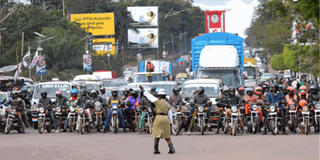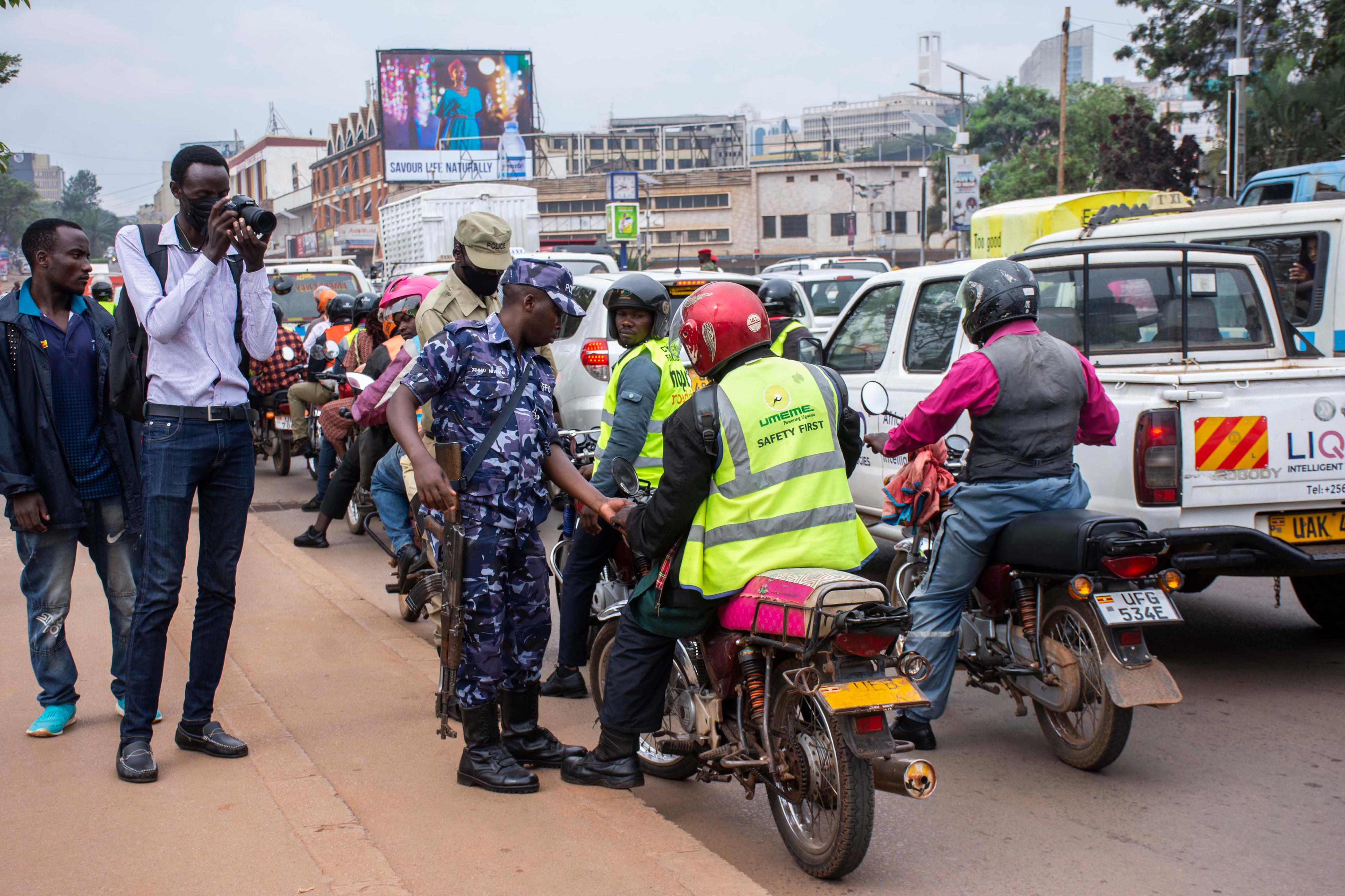Prime
Bodas a death trap for users - experts

A police officer controls traffic flow on Jinja Road in Kampala on August 2, 2022. The registration of boda boda riders is key to proper planning of the City according to KCCA. PHOTO | FRANK BAGUMA
What you need to know:
- The research findings paint a grim picture of a messy transport industry that will cost the governments a huge health burden inform of carbon emissions and treatment for casualties.
A new report on motorcycle transport in sub-Sahara Africa has warned that the boom in the number of motorcycles is a risk to the lives of the citizens.
The researchers have asked the government to take urgent measures to deliver on safety, sustainability, and climate.
The report titled ‘The wheels of change: Safe and sustainable motorcycles in sub-Saharan Africa,’ compiled by three organisations; Amend, the FIA Foundation, and the Fédération Internationale de Motocyclisme (FIM), indicates that motorcyclists account for more than half of road deaths, and as high as 70 percent, in many sub-Saharan countries.
As of October, sub-Sahara Africa had about 27 million registered motorcycles, up from five million in 2010, according to the report.
There research findings further reveal that motorcycles have become significant sources of informal employment with 80 percent used as taxis or for delivery services. The standardised helmet use is the single most effective way of reducing motorcycle head injuries by up to 72 percent and fatalities by up to 39 percent according to WHO.
“Legislation and enforcement for safe use by riders and passengers alongside certified standards, with robust testing facilities, are needed; road design must consider motorcycle safety, deploying speed reduction and designing appropriate or purpose-built infrastructure and there must be an urgent emphasis on providing safe, clean and affordable urban public transit to provide genuine alternatives and stem motorisation,” the report recommends.
The report comes at a time when a separate findings from another study conducted in Uganda shows that motorcycles put a huge public health burden onto the country, with increasing cases of fatalities.
The parliamentary report obtained from data collected from the government regional and national referral hospitals indicate that 11,452 road crashes were registered in admission in the 2021/2022 Financial Year.
The boom in motorcycle numbers has been attributed to cheap imports from China and India and the growth of informal commercial enterprises, which has been used to address mobility gaps in formal and public transport systems.
“The motorcycle boom supports livelihoods and economies by offering new mobility and commerce options and their use is expected to spread and grow. Young men, who often struggle to find formal economic opportunity in the region, have particularly benefited,” the report states.
“The health impacts of motorcycles are, however, profound,” the report warns, adding: “As well as the risk of injury, there are also wider negative environmental, health and social impacts.”
Experts speak
Dr Olive Kobusingye, a Fellow at the George Institute for Global Health, and a senior lecturer at Makerere University School of Public Health, said the transportation systems are failing and are unable to meet the needs of the millions of people trying to get into, across and out of the continent’s dense urban centres.
“Hospitals across Africa are overwhelmed by road traffic injuries, in particular motorcycle-related injuries. African countries need to pay urgent attention to urban transport. Bold and decisive planning and execution are essential to change the overall mobility of our cities,” she said.
Mr Saul Billingsley, the executive director of FIA Foundation, said with some African cities predicted to double in size in the coming decade, there is an urgent need for an action agenda that both mitigates these negative impacts, with a focus on motorcycle helmets, ABS and electrification while planning for low carbon emission.
“In the rapid growth of motorcycle use, we see the balance between lives and livelihoods played out on the streets. Motorbikes provide relatively cheap transportation, but they are expensive for society in injury and environmental damage,” he said.
Mr Tom Bishop, the programme director at Amend and the report’s lead author, said: “I wholeheartedly support efforts to develop mass transit systems in African cities to reduce dependence on private vehicles and to promote walking and cycling, but no matter how much investment and success there is in these areas, motorcycles will still have a part to play in the coming decades.”
Mr Jorge Viegas, the president of FIM, said while Africa needs mobility, which motorcycles have been able to provide, the report highlights several solutions for the inevitable challenges this growth brings.
“Now the focus rightly moves to governments to take up the challenge to make motorcycling in Africa cleaner, safer and more accessible,” he said.
Statistics
Data from Uganda Police Annual Road Traffic report indicates that 1,390 cyclists were killed in 2021 while 528 passengers on motorcycles also died during the same period.
Uganda has more than 1.4 million motorcycles, with Kampala Metropolitan area having more than 750,000, according to Kampala Capital City Authority.
Compliance
On compliance, the report says while 94 percent of riders own helmets, only 59 percent actually use them while riding and that while seven percent carry a passenger helmet, only one percent of passengers actually use them.
Only 26 percent of the riders have licences, a paltry seven percent have formal training, while a whopping 93 percent of them either self-taught themselves how to ride or were trained by their friends, according to the report.
Findings also indicate that 62 percent of the riders have suffered serious injuries on average.
Uganda Police Force has intensified operations against cyclists who flout traffic laws with thousands of them arrested and charged with various offences.



